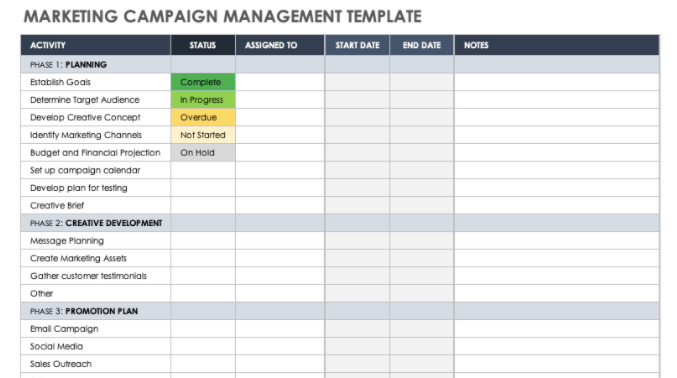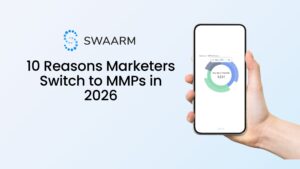Marketing Campaign Management: All you need to know to achieve your goal in 2021
Marketing campaign management is the process behind managing any type of marketing campaign.
A successful marketing campaign can help your business boost brand awareness, generate new leads and sales. Its aim is to engage, inform and educate by conveying how to solve a problem by purchasing and using your offer, service, or product.
Each campaign tracks different metrics like leads, installs, conversions, and ROI. While the advertising channels and formats differ, all campaigns have the same components: a clear goal, an offer or product, a target audience, and a clearly defined message with call-to-action.
All campaigns also require effective advertising campaign management to succeed. Let’s dive deeper into what it means and all that it entails.
What is marketing campaign management?
Marketing campaign management includes the planning, execution, tracking, and analysis of all marketing initiatives performed during the entire cycle of a campaign. All these actions are targeted towards generating potential buyers’ yield towards a company’s products or services.
Usually, marketing campaigns have multiple touch-points and are not linear. So, successful advertising campaign management requires staying on top of different channels and implementing different initiatives, often simultaneously – implementing a range of activities around raising brand awareness and engagement, from inception, through to launch and the evaluation of results.
The goal of marketing campaign management is to maximize opportunities, by optimizing the campaign toward set goals – which is done by analyzing performance on each channel throughout the campaign process. A marketing campaign manager is usually the person responsible for identifying strategies and tactics that work best to support campaign growth.
Using an automation platform like Swaarm helps marketers by cutting down time spent on manual advertising campaign management and streamlining processes. Key features include offer testing, automated insights, data-driven campaign optimization; as well as automated insights, notifications, and client notifications. It also helps track, analyze and optimize campaign metrics in real-time thanks to a data dashboard and a purpose-built, unique analytics tool for campaign reports.
Learn More about “What is marketing campaign management?”
Types of marketing campaigns
Depending on your business goals, there are different types of marketing campaigns to implement:
- Brand awareness campaign: They help you gain as much exposure as possible for your product or services.
- Rebranding campaign: Ideal when changing brand identity elements such as a new logo, brand values, or packaging.
- Product launch campaign: Using a variety of marketing channels you can create buzz around a new product launch.
- Social media marketing campaign: It’s a powerful way to build awareness and engagement, generate leads and drive sales.
- Email marketing campaign: They allow you to reach and nurture leads in your funnel with company events, news, offers, and products.
- Search engine optimization (SEO) marketing campaign: Helps boost your web traffic organically – especially if combined with a valuable content marketing strategy.
- Search engine marketing (SEM) campaign: Target search engine users (Google, Bing, Yahoo) with ads, when they search for a keyword or term that is relevant to your brand.
- Public relations campaign: PR helps grab your audience’s attention via the media.
- Affiliate marketing campaigns and referral marketing: Both campaigns rely on building a network of people who recommend your brand or product to their audience.
- Video marketing campaign: Video is effective and converts better than other formats, as customers prefer to learn about products or services that way.
Learn more about “Top 10 types of marketing campaign explained”
Examples of marketing campaign
Now that you understand different types of marketing campaigns and how they can help you reach your marketing goals, here are some examples for your reference.
- Brand Awareness Campaign: Anheuser-Busch, known as the American Brewery company, produced during COVID-19. They used a brand awareness campaign to build a positive image in the public’s eyes.
- Search Engine Marketing Campaign (SEM): if you check using the keyphrase, ”Best Dentist in New York,” those options that appear above the organic search results with the tag ”Ad” are those that people pay for to appear on the first page of search results.
- Social Media Marketing Campaign: If you scroll through social media platforms such as Facebook or LinkedIn, those posts that appear with the tag ”Sponsored” are those companies that pay to appear to the target audience.
- Rebranding Campaign: Kellog’sKellog’s wanted to rebrand themselves as the European leader in the cereal range. They redesigned the packaging to achieve this goal.
- User-Generated Content (UGC) Marketing Campaign: Starbucks’s RedCupContest is a classic example of a UGC campaign. They run this campaign every year wherein they request their customers to post pictures of their red cup on social media platforms.
- Email Marketing Campaign: Open your email to check the various emails that you have received from various brands or companies. While almost every company is doing it, only a few are doing an extraordinary job.
- Re-engagement Campaign: Starbucks, Grammarly, Amazon, and many companies use this method to ignite interest in people who liked the product but did not purchase it.
Learn more about “7 Examples of Marketing Campaigns.”
Why do you need marketing campaign management?
Effective advertising campaign management will largely affect the outcome of your marketing campaign – to the point of making, or breaking success.
You must work with an excellent marketing campaign manager who can help with the entire campaign cycle, from defining a strategy, through to the analysis phase. On top of the sheer amount of tasks involved in coordinating a campaign, marketing is a fast-paced industry that requires staying on top of the latest industry regulations and trends.
Our top five reasons why you need marketing campaign management are:
- Successful marketing campaign management will bring beneficial results to your organization
- If you want to reach your advertising campaign goals, there are many steps required – and a marketing campaign management expert can oversee them
- You need someone who can track results regularly and interpret the data – then optimize it in a timely way
- Marketing campaign management requires skilfully coordinating a team of experts to achieve successful results
- Advertising campaign management requires using the right marketing mix
Investing in advertising campaign management may seem like a short-term strategy, but compounded over time, the outcome of successful campaigns generated by marketing campaign management will contribute highly to your business growth and evolution.
Learn more about “Why Do You Need Marketing Campaign Management?”
Steps to effective marketing campaign management
eMarketer research estimates that marketers waste about 26% of their marketing budgets – so, effective advertising campaign management can help you avoid that.
Project management is a key skill required, as even the most creative marketing campaign won’t succeed if it is not implemented in the most optimal way. So, ensure that you have an effective marketing campaign management process in place before embarking on it.
Below are seven key steps to effective marketing campaign management:
- Plan your concept and campaign resources, including budget: What is the concept of your marketing campaign? How will you create it and who will assist you in this task?
- Define your audience and their channels: Who are you targeting? Draw up a profile.
- Define your goals and how you will measure success: What is the purpose of the campaign? Think about how you will measure your campaign and quantify success.
- Identify your marketing campaign tools and other resources: Use automation tools to plan, manage or measure your campaign.
- Distributing and amplifying your marketing campaign: Define which channels you will use to target your users and set a strategy.
- Create your marketing campaign content and make sure that messaging, content, and visuals are on-brand and consistent
- Test and evaluate your marketing campaign: Reviewing campaign data is an important final step you shouldn’t miss
Learn more about “Steps to Effective Marketing Campaign Management”
What does a campaign manager do?
There is a marketing team that works on campaign management. A campaign manager is one of those people responsible for creating and running marketing campaigns. Here are some of the tasks that a campaign manager takes care of:
- Work with stakeholders in the marketing team or work with external agencies to run marketing campaigns.
- Oversee the development of advert design and the message that goes along with it.
- Have sufficient knowledge in creating, requesting, and managing budgets.
- They are also good at communication. Campaign managers know how to work with different people to get the desired outcome.
- Set up and manage various campaigns, sometimes simultaneously.
- Check the analytics to check which campaigns are working well and make changes to those not working well.
Learn more about “What Does A Marketing Campaign Manager Do?“
Here’s how you can pick the best marketing campaign management software:
There are many types of marketing campaign management software available in the market. Different companies offer different features to their customers. While there are so many choices, here are some of the things that you need to consider when you pick a campaign management software:
- Campaign Management: The tool should allow you to set campaigns, set up deadlines, and manage the various marketing campaigns that you create.
- Integrate With Other Platforms: Toggling between different screens is never fun. Marketers can work comfortably on campaigns when they can easily integrate campaign management software with other external platforms and tools.
- Automation: This software should permit marketers to track the completion of tasks and automate some steps in campaign setup and execution.
- Analytics and Reports: The campaign management software should also provide analytics and reports. This data helps marketers to make informed decisions.
Learn more about “How To Choose The Best Marketing Campaign Management Software?“
Marketing campaign management tools
Using the right marketing campaign management tools will help you stay on top of all your tasks, making your process much more organized and streamlined.
Depending on the campaign, you might use one or more of the following:
- Marketing automation and data analytics tools: Ideal for campaign scheduling, customer segmentation, content creation, and analytics.
- Project management tools: Use them to assign tasks and manage teams
- Online advertising tools: They measure ROI across all online advertising channels.
- CRM tools: Simplify the process of inbound/outbound leads to conversions.
- Social media marketing tools: They can gather data, brand sentiment, schedule content, and nurture leads.
- Email marketing tools: Once you’ve driven traffic to your website or landing page, use it to convert your leads via a targeted email marketing campaign
- SEO marketing tools: Check any URL’s top organic keywords
- Content and graphic creation tools: Use them to maintain on-brand visual experience
Using an advertising campaign management software will optimize time and resources – helping to maximize efforts towards campaign success, which will lead to business growth.
Ask recommendations from fellow industry experts, and spend time testing different tools. Many of these softwares offer a trial period and others, like Swaarm, offer easy, fast, and smooth onboarding.
Learn more about “The best marketing campaign management tools”
Marketing campaign management best practices
Our top five advertising campaign management best practices include:
- Kick off your advertising campaign planning with a clear brief and defined roles
Set common goals within the team, assign responsibilities, and manage expectations, to ensure everyone is aligned from the start. Create and share a detailed brief to use during the campaign. - Motivate your team and empower them during the campaign
Delegate tasks to the right experts, give feedback, and celebrate small wins to keep the team motivated. Building good relationships will enable you to build long-term success not just for your campaign, but for your business too. - Measure campaign analytics often, using automation to optimize goals
Track campaign progress frequently against set KPI’s – whether it’s generating brand awareness, driving click-through rates (CTR), or raising conversion rates (CR) – and optimize accordingly. - Use the right marketing campaign management tools
As we explained in the previous paragraph, using a combination of the right campaign management tools is essential for getting the best results. - Debrief correctly with your team once the campaign ends
It’s just as important to send campaign results to advertisers as it is to assess performance with your team. What are the strengths and weaknesses? What areas need improvement? Gather feedback and implement it in future campaigns.
Learn more about “Marketing Campaign Management Best Practices”
The optimal marketing campaign management template
Using an effective advertising campaign template will help you establish the framework for planning for your marketing initiatives. It will also ensure that your campaign is performed optimally,
You can create your template in five simple steps:
1. Pull out a spreadsheet. Break down your campaign into phases: Planning, Testing, Launch, Execution, and Measurement. Put these into rows.
2. Break down the marketing campaign brief into tasks. Next to the task column, create a series of columns including the following elements:
- Activity: What is the task?
- Start date
- End date
- Priority Status: High, Medium, Low
- Status/task progress: Is the task complete, overdue, in progress, on hold, archived?
- Account lead/assigned to: Who is the person in the team responsible?
- Notes: Any blockers or hold-ups to the task being completed?
3. Write each task in a different row under the “Activity” column. For example, under the “planning” section, you may write: “Peter to establish campaign goals between 1 and 2 November. Notes: pending budget sign-off.”

4. Keep adding tasks until you’ve translated all your brief into tasks.
5. Use the template every day as a reference to keep track of campaign progress. Make adjustments as the plans change and check-in with your team to ensure everyone is aligned.
Learn more about “The Ideal Marketing Campaign Management Template”
Summary of marketing campaign management
Understanding “marketing campaign management” starts with having an awareness of the marketing campaign cycle, because it encompasses all the different steps and actions performed by a marketing campaign manager.
In fact, advertising campaign management requires thoughtful planning, timely execution, and a thorough knowledge of the audience you are targeting. Regardless of the type of campaign you run, using an automation tool like Swaarm can help you to analyze campaign results more effectively. You can access campaign data in real-time with an easy-to-use interface, enabling you to optimize KPI’s where needed and in fewer steps – so you can save up on time and boost your campaign results.
It’s essential to apply key learnings for improvement in your future campaigns. Ultimately, marketing campaign management is a huge determining factor: how well you create, execute, and review your marketing campaign will make your business stand out from the competition – leading to more visibility, higher revenues, and long-term success.
Swaarm is an affordable, easy-to-use platform for successfully measuring, optimizing, and automating your marketing efforts. Contact us to find out how our innovative technology can help you grow your business at scale.









